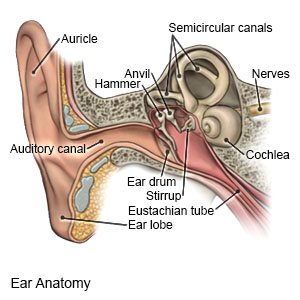Acoustic Neuroma
Medically reviewed by Drugs.com. Last updated on Aug 4, 2025.
AMBULATORY CARE:
An acoustic neuroma (AN)
is a slow growing, benign (not cancer) tumor. The tumor grows on the nerves that control balance, hearing, and feeling in your face. AN also grows on the nerve that moves muscles used for chewing. Rarely, it grows large enough and blocks fluid from going to your brain. Normally, it only affects one ear.
 |
Common symptoms include the following:
- Partial or total hearing loss in one ear
- Numbness, weakness, or twitching on one side of your face
- Ringing in your ear
- Dizziness, poor balance, or trouble walking
- Full feeling or pain in your ear
- Headaches or trouble chewing
Related medications
Treatment options
The following list of medications are related to or used in the treatment of this condition.
Contact your healthcare provider if:
- Your symptoms get worse.
- Your symptoms return after treatment.
- You have questions or concerns about your condition or care.
Treatment for AN
depends on how severe your symptoms are and the size of the tumor. Treatment may also depend on your age. You may not need treatment if the tumor is small. Your healthcare provider may want to monitor your AN with regular MRI scans. You may need surgery to remove all or part of your AN. You may, instead, need radiation treatment to shrink your AN.
Follow up with your doctor as directed:
Write down your questions so you remember to ask them during your visits.
© Copyright Merative 2025 Information is for End User's use only and may not be sold, redistributed or otherwise used for commercial purposes.
The above information is an educational aid only. It is not intended as medical advice for individual conditions or treatments. Talk to your doctor, nurse or pharmacist before following any medical regimen to see if it is safe and effective for you.
Learn more about Acoustic Neuroma
Treatment options
Care guides
Symptoms and treatments
Further information
Always consult your healthcare provider to ensure the information displayed on this page applies to your personal circumstances.
